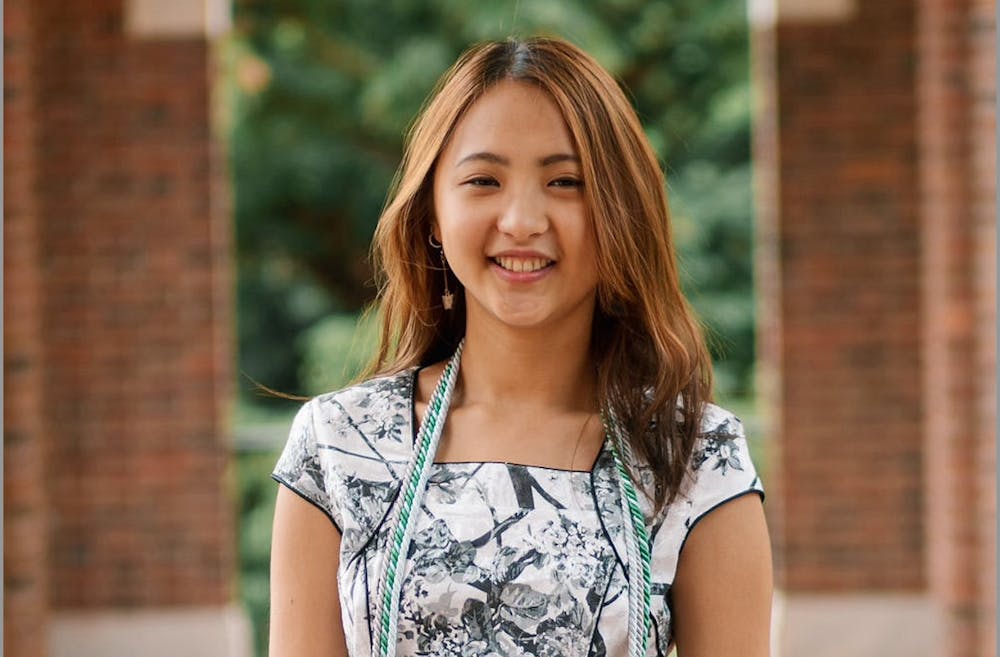Elly Ren is a 2021 Hopkins alum currently working as the program coordinator at the Factory Farming Awareness Coalition (FFAC). In an interview with The News-Letter, she discussed her interests in sustainability and renewable energy, touching on her experiences of foraging at Hopkins and advocating for better food systems.
The News-Letter: What sparked your interest in sustainable energy and food production?
Elly Ren: In high school, I participated in the Science Olympiad, where I was introduced to a bunch of environmental topics like ecology, invasive species, entomology and herpetology. I got into documentaries and learning about the food system. In particular, one documentary called Cowspiracy: The Sustainability Secret really opened my eyes to the connection between factory farming and environmental degradation and climate change. I came into Hopkins with this passion to address the food system as an Environmental Science and International Studies major. I was really interested in the science, but I knew that what was limiting any action was policy and changing humans [given that] we already have all the facts and all the solutions.
N-L: What are you working on now, and what impact are you hoping to have?
ER: I'm the program coordinator for our Advocacy Institute, which is our training program for advocates at FFAC. We’re working to empower people to end factory farming and increase awareness, which will hopefully lead to a movement of folks working in different sectors to make the food system better [and] lead to a cultural shift toward more plant-based consumption. A great example that shows that we need a cultural shift is the reception of Meatless Mondays at Hopkins. It's really trashed and made fun of, and I think people don't realize that there are real environmental and ethical implications with our food system. If we can shift away from a culture where meat is normal, necessary and nice, then, hopefully, we can create a more just and sustainable food system, which is the vision we have at FFAC.
N-L: What did you learn about sustainability and food production in Baltimore during your time here?
ER: I was amazed that Baltimore had a really thriving community of vegans, animal advocates and people who are reducetarian, which is someone who's trying to reduce the number of animal products they're eating. I love Baltimore for that. There were a lot of different events like vegan burger smackdowns and a vegan mac and cheese competition.
Baltimore is also a hub for food activism. There's this great organization called the Black Yield Institute and different clubs that are producing so much knowledge for the movement and to promote education. They've really opened my mind to how we frame justice issues. For example, the Johns Hopkins Center for a Livable Future coined the term “healthy food priority areas” as an alternative to the term “food desert,“ which can be a misnomer because it implies that there's a lack of food. “Food apartheid” more accurately describes how lack of access to food is an intentional system that has to do with things like redlining, which Baltimore has a history of. I was really impressed with the work that was being done in Baltimore, and it really supplemented my learning in class.
N-L: Tell me about the foraging you’ve done at Hopkins.
ER: I found Baltimore to be such a great place to forage, which is the act of collecting and gathering things that are growing in the wild. I was first exposed to it in this foraging hike by the Hopkins Ecological Design Initiative. It was at Stoney Run, the forest on the west side of campus. Another thing that heightened my awareness of it was when I was interning with FFAC, and we would weed plots. A lot of these “weeds” that we were throwing away were edible. Right now, children can recognize over 100 corporate brands, but they can't even recognize 10 different plants growing near them. It just shows how disconnected we are with our food.
I started looking for things that were easy to forage like dandelions, for example. A lot of people don't know they’re completely edible and super beneficial. On campus right now, magnolia trees are blossoming. The petals are really great — you can throw them in salads, use them as a garnish or pickle them. There are trees near Shriver Hall called Kousa dogwood that produce sweet fruits during the fall that taste like mango and persimmon. The redbud trees on campus are also super yummy.
[Foraging] was definitely supported by my love for nature and my yearning for connection to nature. It also just made my heart blossom seeing people have the light bulb go off in their head and realize, “Oh, this is edible.” I think more people realizing a lot of the stuff growing around them is edible is a huge solution to issues we have in the food system. If people learn how to cook with and recognize them, that would be transformative for society.
N-L: As an alum, what are some takeaways from your time at Hopkins?
ER: Folks should definitely get off campus and actually forge relationships with people in the community, not just participate in one-time kind of activities. Of course, I know that's hard, but it's really valuable to root yourself in a city’s community and engage with people that aren't just students and faculty.
N-L: Finally, if you were a type of renewable energy, which one do you think you'd be?
ER: I would be wind actually because people have described me as very chill and calm, as if I've reached this inner peace, which I think I have.





